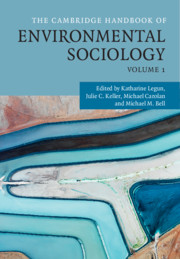Book contents
- The Cambridge Handbook of Environmental Sociology Volume 1
- The Cambridge Handbook of Environmental Sociology
- Copyright page
- Contents
- Figures
- Tables
- Contributors
- Foreword
- Introduction
- Part I Theory in Environmental Sociology
- Part II The Economy and Environmental Sociology
- 6 Material Worlds: Understanding the Relationship of Capital and Ecology
- 7 Green Economies and Community Wellbeing
- 8 Beyond the Limits to Growth: Neoliberal Natures and the Green Economy
- 9 The Ecosocialist Alternative
- 10 Commons, Power, and (Counter)Hegemony
- 11 Emplacing Sustainability in a Post-Capitalist World
- Part III Culture and Environmental Sociology
- Part IV Politics, Power, State
- Part V Social Justice
- Index
- References
10 - Commons, Power, and (Counter)Hegemony
from Part II - The Economy and Environmental Sociology
Published online by Cambridge University Press: 05 November 2020
- The Cambridge Handbook of Environmental Sociology Volume 1
- The Cambridge Handbook of Environmental Sociology
- Copyright page
- Contents
- Figures
- Tables
- Contributors
- Foreword
- Introduction
- Part I Theory in Environmental Sociology
- Part II The Economy and Environmental Sociology
- 6 Material Worlds: Understanding the Relationship of Capital and Ecology
- 7 Green Economies and Community Wellbeing
- 8 Beyond the Limits to Growth: Neoliberal Natures and the Green Economy
- 9 The Ecosocialist Alternative
- 10 Commons, Power, and (Counter)Hegemony
- 11 Emplacing Sustainability in a Post-Capitalist World
- Part III Culture and Environmental Sociology
- Part IV Politics, Power, State
- Part V Social Justice
- Index
- References
Summary
This chapter explores the various analytical traditions studying the commons, the different meanings each ascribes to this concept, and their implications for challenging and generating alternatives to dominant power relations, practices, institutions and common senses (ideas). I begin by discussing the institutional tradition of commons theory, and analyzes how they are governed through collective actions and rules (institutions). I then discuss the critique of this approach from political ecology, which situates commons in the political-economic context of capitalist development. I then identify four additional understandings of commons: as social relations and commons-making practices, as movements, as an alternative political-ecological paradigm, and as counter-hegemonic environmental politics.I conclude arguing that commons invite (re)thinking of key common senses in capitalist hegemony, such as private property and the concept of property itself, the developmentalist/extractivist, growth-based economy and its violent enclosures and dispossessions, democracy and “the state”, the separation of “nature” and “humans.,” and purely rational and individualistic subjectivities.
Keywords
- Type
- Chapter
- Information
- The Cambridge Handbook of Environmental Sociology , pp. 152 - 175Publisher: Cambridge University PressPrint publication year: 2020

